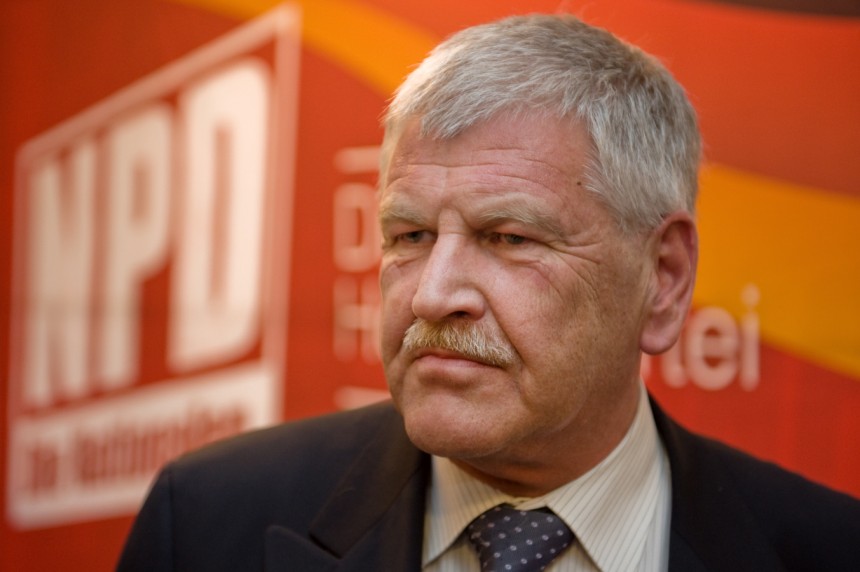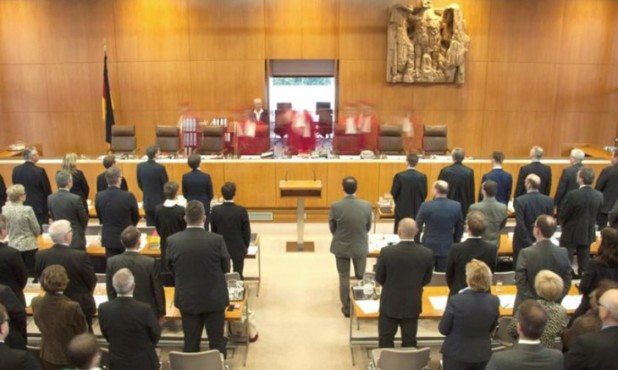The New Observer
March 4, 2016
Several German Constitutional Court judges have expressed their doubts that the German state’s attempt to ban the National Democratic Party of Germany (Nationaldemokratische Partei Deutschlands, NPD) will come to pass, as the legal case against the party appeared to falter during the third day of hearings.
Although the judges, sitting in the Constitutional Court in Karlsruhe, said that the NPD’s policy program contained “anti-constitutional” elements, this alone was insufficient for a ban.
The proceedings against the NPD opened on Tuesday this week, after the governments of all the federal German states launched a joint application to the court to have the party, first founded in the 1960s, banned as “unconstitutional.”
NPD leader Frank Franz was grilled today on his party’s citizenship policy, creating a cross-questioning scene, which one media source described as “rare” in that court.
Franz was asked if, when the party program spoke about the “national community,” it meant all nationals or just the “ethnic Germans.” He said that a “nation is defined by a common language, culture, and history, and that the members of a nation are not interchangeable.”
Pressed further, he said that a “national community comprises citizens,” and that the NPD based its definition of citizenship upon the 1913 Citizenship Law, which is based upon the Jus sanguinis (“right of blood”) principle, in terms of which citizenship is not determined by place of birth but by having parents who are citizens of the state.
Judge Peter Müller then quoted from a training brochure for the youth wing of the party which said that an “African, Asian, or Oriental can never be German. A German is someone who has German parents. Being German is an issue of birth, and is not acquired through the adoption of citizenship.”
He then asked Franz the question: “If a child has an Asian mother and an African father, can it [the child] be German?”
Franz’s answer: “I do not answer hypothetical questions,” did not seem to satisfy the judge, who then pointed out another quote from the brochure which said that “Integration is genocide.”
Franz admitted that this was “bold language,” but went on to agree that the party’s program called for the exclusion of land-owning rights to foreigners, and their exclusion from health and pension insurance.
Furthermore, he said, the NPD would withdraw citizenship from migrants who had been granted that right, and would immediately completely halt the “open borders” asylum policy. The only time Germany under a NPD government would consider giving anyone asylum he said, was if that person had “rendered outstanding services to the country.”
Other judges questioned the federal states’ representatives over their allegations that the NPD was “dangerous,” pointing out that the central state intelligence service’s own reports indicated that the party was tiny in numbers and was politically insignificant.
Judge Müller quoted from several of these reports, asking the prosecution: “Where is there a danger for democracy?” He was met with silence.
Court President Andreas Vosskuhle also asked the prosecution to provide evidence of the claim that the party engaged in “destructive behavior which threatened the free democratic order.” Once again, the prosecution could provide no evidence.
The Constitutional Court will now examine in detail the arguments presented during the hearings, but first, the NPD has a six-week deadline to submit further comments. After that, the prosecution will also be granted six weeks to respond, which means that a decision is not expected in the case for several months.

